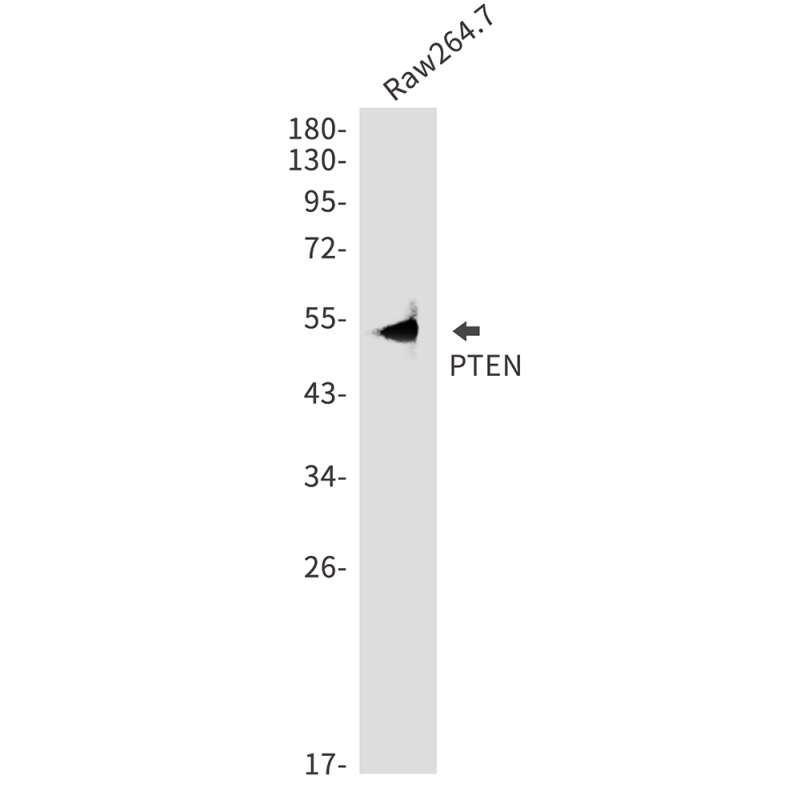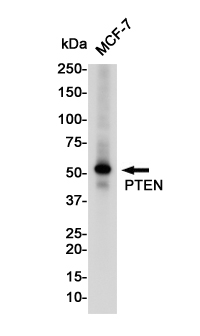

| WB | 咨询技术 | Human,Mouse,Rat |
| IF | 咨询技术 | Human,Mouse,Rat |
| IHC | 咨询技术 | Human,Mouse,Rat |
| ICC | 技术咨询 | Human,Mouse,Rat |
| FCM | 咨询技术 | Human,Mouse,Rat |
| Elisa | 咨询技术 | Human,Mouse,Rat |
| Aliases | PTEN; MMAC1; TEP1; Phosphatidylinositol 3; 4; 5-trisphosphate 3-phosphatase and dual-specificity protein phosphatase PTEN; Mutated in multiple advanced cancers 1; Phosphatase and tensin homolog |
| Entrez GeneID | 5728 |
| WB Predicted band size | Calculated MW: 47 kDa; Observed MW: 54 kDa |
| Host/Isotype | Rabbit IgG |
| Antibody Type | Primary antibody |
| Storage | Store at 4°C short term. Aliquot and store at -20°C long term. Avoid freeze/thaw cycles. |
| Species Reactivity | Human |
| Immunogen | Recombinant protein of human PTEN |
| Formulation | Purified antibody in TBS with 0.05% sodium azide,0.05%BSA and 50% glycerol. |
+ +
以下是关于PTEN抗体的3篇参考文献示例(内容基于公开信息概括,具体细节需核对原文):
---
1. **文献名称**:*PTEN/MMAC1/TEP1 in Signal Transduction and Tumorigenesis*
**作者**:Sansal, I.; Sellers, W.R.
**摘要**:综述了PTEN蛋白在信号通路(如PI3K/AKT通路)和肿瘤发生中的作用,强调了特异性抗体在检测PTEN表达缺失(如癌症组织中的Western blot和免疫组化)中的关键应用。
2. **文献名称**:*Pten dose dictates cancer progression in the prostate*
**作者**:Trotman, L.C.; et al.
**摘要**:通过小鼠模型研究PTEN剂量与前列腺癌进展的关系,利用PTEN抗体进行组织特异性染色,发现PTEN表达水平与肿瘤恶性程度呈负相关。
3. **文献名称**:*Overexpression of PTEN inhibits proliferation and differentiation of 3T3-L1 adipocytes*
**作者**:Gimm, O.; et al.
**摘要**:研究PTEN在脂肪细胞分化中的功能,通过多种PTEN抗体验证蛋白表达,证明PTEN过表达可抑制脂肪生成相关通路,提示其代谢调控作用。
---
如需更多文献,建议在PubMed或Web of Science中检索关键词“PTEN antibody validation”或“PTEN immunohistochemistry”。
The PTEN (Phosphatase and Tensin Homolog) antibody is a crucial tool in cancer research and molecular biology, targeting the PTEN protein encoded by the *PTEN* gene, a well-characterized tumor suppressor. PTEN functions primarily as a lipid phosphatase, negatively regulating the PI3K/AKT/mTOR signaling pathway by dephosphorylating phosphatidylinositol (3.4.5)-trisphosphate (PIP3), thereby controlling cell proliferation, survival, and metabolism. Loss or mutation of PTEN is linked to various cancers (e.g., glioblastoma, prostate, and breast cancers), as well as metabolic and neurological disorders.
PTEN antibodies are widely used to detect PTEN expression levels, localization (cytoplasmic/nuclear), and post-translational modifications (e.g., phosphorylation, ubiquitination) in techniques like Western blotting, immunohistochemistry (IHC), immunofluorescence (IF), and flow cytometry. These antibodies are available in multiple formats, including monoclonal and polyclonal variants, derived from hosts like mice, rabbits, or goats. Specific clones (e.g., D4.3. 138G6) are validated for distinct applications, ensuring sensitivity and specificity.
Researchers rely on PTEN antibodies to study its role in tumorigenesis, therapeutic resistance, and crosstalk with pathways like EGFR and RAS. Proper validation using PTEN-deficient cell lines or tissues is critical to confirm antibody specificity, as cross-reactivity with pseudogenes or homologous proteins can yield false results. Advances in antibody engineering continue to enhance detection accuracy, supporting both basic research and clinical diagnostics.
×